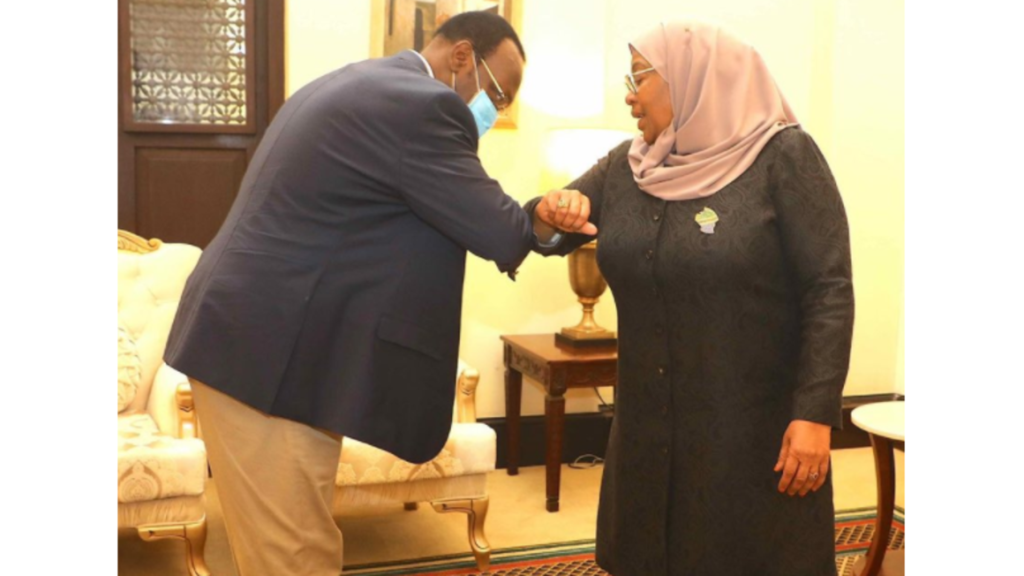
Mbowe: Meeting President Suluhu was a milestone
Published on March 10, 2022 at 8:03 AM by Chisomo Kambale
Dar es Salaam. Chadema chairman Freeman Mbowe on Tuesday, March 8, said the meeting with President Samia Suluhu Hassan shortly after being freed from remand prison was an opportunity the party was looking for since the fifth phase government.
He allayed fears to party cadres, members, and supporters, saying they met to set the framework that would enable the country to conduct peaceful and just politics.
The 61-year-old politician urged them to follow the philosophy of Martin Luther King, which is centered on forgiveness love, and patience.
Mbowe made the statement in Iringa Region where he addressed the nation through the party’s women wing (Bawacha) meeting to mark International Women’s Day (IWD).
“We are going to use the opportunity to arrive at the goal of building a just and equal society. There are people who would like to gain quick achievements, but my 30 years experience in the party shows that patience pays,” he said.
Last Friday, Mbowe was released from remand prison where he spent 227 days following terrorism charges he was facing alongside three co-accused persons.
On the same day, he met President Hassan at the Magogoni State House where both through video clips informed the public of their agreement to hold constructive, trustful, respectful, and unification politics for the interest of the country.
However, in his explanation, Mbowe said after the framework has been set, the party’s meeting of the Central Committee (CC) would be convened in the next seven days to discuss it. He said all party organs would be involved in the process, insisting that it would be illogical to turn down the President’s invitation that had been sought for the last five years.
Explaining efforts made by the party, the former Leader of the Official Opposition Camp in Parliament said Chadema submitted three letters requesting to meet former President Magufuli, but in vain.
“It doesn’t mean we didn’t meet. But we met in unofficial activities that couldn’t be used to discuss issues of national interest according to our plans,” he said.
“Therefore, meeting with President Samia (Suluhu Hassan) was an opportunity for our party. Our meeting focused on building principles that would enable our people to build the nation peacefully, something she has really shown a political will,” added Mbowe.
Mbowe said both sides agreed that there was a need to build understanding and consensus by preaching sustainable justice instead of hangings, planting fake cases, and shooting each other.
“She assured me of her intention. However, Chadema has never failed the government, rather the government has been failing. People are interested in development issues like construction of classrooms etc, but we should also be given an opportunity to inform citizens about their rights,” he said.
The former Hai Constituency MP said the high level of fears shown by party cadres, members, and supporters described the lack of belief among the two sides, hinting that processes of peace have implementation stages.
“Nelson Mandela spent over two years in Prison meeting the then apartheid South African government. The two sides went for implementation immediately after his release,” he said.
According to him, there was no content of the framework that has been discussed by the two sides, emphasizing that party organs would be fully involved during the process. “There are some people who would like me to disclose everything we talked about. It is right, but there are things that should be disclosed later,” said Mbowe.
During the meeting, Mbowe assured party members that Chadema will continue doing politics characterized by policy competition that recognizes democracy as the key principle of development.
He said Chadema has never and will never be the puppet of any political party and the state, noting that there were no times the party used force in the search for the leadership of the state.
The party has been built according to political, cultural, and economic principles enshrined in the Chadema Constitution that enables the party to fight for true freedom, democracy, justice, and people-centered development, according to him.


